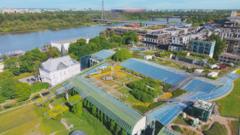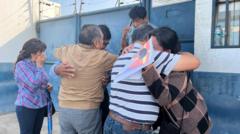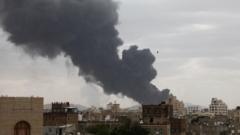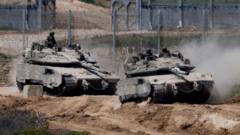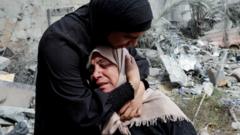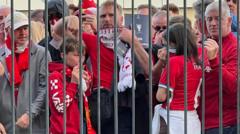**Police Deploy Thousands to Ensure Safety at France-Israel UEFA Nations League Match**
**France Bolsters Security for International Match Amidst Tensions**
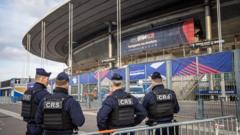
**France Bolsters Security for International Match Amidst Tensions**
**Stadium on High Alert Following Recent Violence Involving Maccabi Fans**
In preparation for the highly anticipated UEFA Nations League match between France and Israel, thousands of police officers will be deployed throughout Paris, particularly around the Stade de France. The increased security comes in the wake of violent incidents involving Maccabi Tel Aviv supporters in Amsterdam just a week prior. Paris police chief Laurent Nuñez announced that approximately 4,000 officers will be on duty, with 2,500 stationed at the stadium itself and the rest monitoring public transport and key locations in the capital.
Additionally, around 1,600 private security personnel will manage safety within the stadium while an elite anti-terrorist unit will accompany the Israeli team. The heightened security measures reflect the "high-risk" designation of the event, stemming from a "very tense geopolitical context," as outlined by Mr. Nuñez, who emphasized the intention to maintain public order.
The forthcoming match will see significantly reduced attendance, with only around a quarter of the stadium's capacity expected to be filled due to concerns expressed by the Israeli government regarding fan safety. Although the match is anticipated to attract a blend of supporters, the situation is somewhat precarious, as highlighted by the recent violent attacks on Maccabi fans in Amsterdam, which resulted in condemnation of a perceived revival of antisemitism across European politics.
In response to these incidents, French President Emmanuel Macron has expressed his intent to attend the match to show solidarity with the Jewish community and combat rising antisemitic sentiments. Accompanying him will be notable political figures, including Prime Minister Michel Barnier and former Presidents François Hollande and Nicolas Sarkozy.
An interesting dynamic has emerged, with groups protesting for the cancellation of the match as part of broader pro-Palestinian demonstrations, leading to instances of clashes with police. Relations between France and Israel have also been under scrutiny during this time, with recent political tensions complicating an already delicate situation.
Preparation for the match indicates a concerted effort to ensure that, despite geopolitical tensions, the event can proceed in a secure environment. As the countries face challenges related to their historical context and current conflicts, the response to such events will likely continue to shape public dialogue surrounding the intersection of sport, politics, and identity in Europe.
Additionally, around 1,600 private security personnel will manage safety within the stadium while an elite anti-terrorist unit will accompany the Israeli team. The heightened security measures reflect the "high-risk" designation of the event, stemming from a "very tense geopolitical context," as outlined by Mr. Nuñez, who emphasized the intention to maintain public order.
The forthcoming match will see significantly reduced attendance, with only around a quarter of the stadium's capacity expected to be filled due to concerns expressed by the Israeli government regarding fan safety. Although the match is anticipated to attract a blend of supporters, the situation is somewhat precarious, as highlighted by the recent violent attacks on Maccabi fans in Amsterdam, which resulted in condemnation of a perceived revival of antisemitism across European politics.
In response to these incidents, French President Emmanuel Macron has expressed his intent to attend the match to show solidarity with the Jewish community and combat rising antisemitic sentiments. Accompanying him will be notable political figures, including Prime Minister Michel Barnier and former Presidents François Hollande and Nicolas Sarkozy.
An interesting dynamic has emerged, with groups protesting for the cancellation of the match as part of broader pro-Palestinian demonstrations, leading to instances of clashes with police. Relations between France and Israel have also been under scrutiny during this time, with recent political tensions complicating an already delicate situation.
Preparation for the match indicates a concerted effort to ensure that, despite geopolitical tensions, the event can proceed in a secure environment. As the countries face challenges related to their historical context and current conflicts, the response to such events will likely continue to shape public dialogue surrounding the intersection of sport, politics, and identity in Europe.



